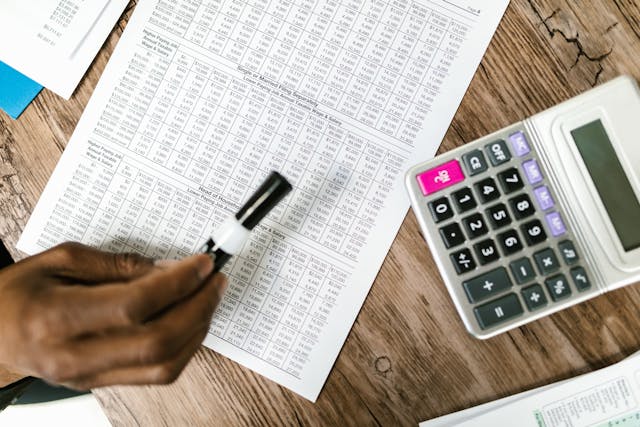Comments
- No comments found

Filing a self-assessment tax return accurately and on time is pivotal to financial responsibility.
This process ensures individuals meet their tax obligations while avoiding potential consequences associated with failure to file or late payments, such as fines and penalties.
Understanding the self-assessment process is equally essential, granting taxpayers insights into their financial responsibilities and obligations. By comprehending the requirements of self-assessment, individuals can navigate the complex world of personal taxation with confidence.
In this article, the accountants Howlader & Co. explain the significance of timely and precise tax submissions, shedding light on the consequences of non-compliance and emphasizing the benefits of a proactive and informed approach to the self-assessment process.

Gathering necessary documents is a crucial step in the self-assessment tax return process, ensuring a comprehensive and accurate submission.
Essential documents include income statements, expense receipts, and tax-related correspondence. Income statements encompass various sources, such as employment, self-employment, or rental income. Expense receipts, covering allowable deductions, contribute to reducing taxable income. Tax-related correspondence, including P60s and P45s, provides crucial information.
Maintaining accurate records throughout the year is paramount. Organized documentation simplifies the tax return process, minimizing errors and omissions. It is advisable to keep a meticulous record of income, expenses, and any relevant financial transactions. This not only facilitates a smoother tax filing experience but also ensures compliance with tax regulations.
Registering for self-assessment is a pivotal step in fulfilling tax obligations, and understanding the process is essential for individuals navigating the UK tax system. Eligibility criteria typically include being self-employed, having substantial untaxed income, or being a higher-income earner with specific circumstances.
The registration process involves obtaining a Unique Taxpayer Reference (UTR) from HM Revenue and Customs (HMRC). This UTR serves as a unique identifier for tax purposes. It is crucial to register on time, as failure to do so may result in penalties. Late registration can also lead to delays in receiving important information and notifications related to tax responsibilities.
Avoiding penalties is paramount, and registering promptly is the key. The HMRC provides a user-friendly online registration portal, simplifying the process for individuals. It's imperative to have all necessary information, including personal details, National Insurance number, and details about sources of income, at hand during registration.
New self-assessment registrants can benefit from the support and guidance offered by HMRC and tax professionals. HMRC provides comprehensive resources online, including guides and tutorials, to assist individuals throughout the registration process. Additionally, seeking advice from tax professionals, such as accountants or tax advisors, can provide personalized assistance and ensure that all necessary details are correctly submitted.
Completing a self-assessment tax return involves a series of steps that taxpayers in the UK must follow to accurately report their income, expenses, and other financial details. Understanding this process is crucial to ensure compliance with tax laws and avoid fines or penalties.
The initial step is to register for an online account with HMRC. Once registered, individuals can access the self-assessment portal, where they will find the necessary forms and sections to complete. The online platform streamlines the process, offering a user-friendly interface and providing a secure environment for submitting sensitive financial information.
Filling out the relevant sections of the tax return involves detailing various aspects of one's financial situation, including sources of income, allowable expenses, and any tax reliefs or deductions applicable. Accuracy and completeness are paramount during this stage, as any discrepancies or omissions may result in fines or penalties. Taxpayers should ensure that they have all relevant documentation, such as income statements, receipts, and correspondence, to support the information provided.
To assist individuals in the accurate completion of their self-assessment tax return, HMRC offers online tools and guidance. These resources provide valuable information on specific sections of the tax return, offer clarifications on complex tax matters, and help individuals understand their tax obligations better.
Submitting the completed tax return on time is critical to avoid fines. The deadline for filing a self-assessment tax return is typically January 31st following the end of the tax year. Late submissions can result in penalties, even if there is no tax to pay.
Once the self-assessment tax return is completed and submitted, the next crucial step is paying the assessed taxes. Understanding the process of paying self-assessment taxes, adhering to payment deadlines, and maintaining meticulous records are vital aspects of fulfilling tax obligations in the UK.
Payment deadlines are critical to avoid penalties and interest charges. The deadline for paying the tax owed is usually January 31st following the end of the tax year, the same as the filing deadline. Failing to pay taxes by this date can result in penalties and interest accrual on the outstanding amount. It is essential to plan ahead, ensuring that the necessary funds are available to meet the payment deadline.
HMRC offers various methods for paying self-assessment taxes. The most common methods include online bank transfer, debit or credit card payments, and setting up a direct debit. Taxpayers should choose a payment method that suits their preferences and ensures timely settlement of their tax liability.
Paying taxes on time is not only a legal obligation but also prevents the accumulation of interest charges and penalties. HMRC imposes penalties for late payments, which can increase over time based on the duration of the delay. To avoid these financial consequences, individuals must prioritize meeting the payment deadline.
In addition to timely payments, maintaining accurate records is crucial for at least six years following the submission of the self-assessment tax return. HMRC may conduct an enquiry or investigation into a taxpayer's financial affairs during this period. Having well-organized records, including receipts, invoices, and relevant financial documentation, provides necessary evidence to support the information declared in the tax return. This preparation can prove invaluable in the event of an HMRC enquiry, helping to demonstrate compliance with tax laws.

Seeking professional advice for self-assessment tax returns can significantly enhance the accuracy and efficiency of the process, ensuring compliance with tax laws and optimizing financial outcomes. The benefits of enlisting the expertise of tax professionals are multifaceted, encompassing precision, deduction maximization, and penalty avoidance.
One key advantage of consulting tax professionals is the assurance of accuracy in the preparation of self-assessment tax returns. Tax regulations and laws can be complex, and professionals possess the knowledge and expertise to navigate these intricacies. Their understanding of tax codes allows for the precise interpretation and application of rules, minimizing the risk of errors that could lead to penalties or scrutiny from HMRC.
Tax professionals, including accountants, tax advisors, and tax preparation services, are well-versed in identifying eligible deductions and credits. Their expertise enables taxpayers to maximize their allowable deductions, potentially reducing their overall tax liability. This proactive approach ensures that individuals leverage every available opportunity to optimize their financial position within the bounds of tax regulations.
Choosing the right professional is paramount to the success of this collaborative effort. Reputable and qualified tax professionals bring a wealth of experience and a commitment to ethical practices. They stay abreast of evolving tax laws and regulations, ensuring that their advice aligns with the latest developments. Engaging with a trustworthy professional establishes a partnership built on transparency, trust, and a shared goal of achieving the best possible financial outcome.
Taxpayers have various options when seeking professional assistance, each catering to different needs and preferences. Certified public accountants (CPAs) are qualified accountants with expertise in tax matters. Tax advisors specialize in providing strategic advice on tax planning and compliance. Tax preparation services, often available online or through dedicated firms, offer comprehensive assistance in completing and filing tax returns.
Accurate and timely self-assessment tax filing is crucial to sidestep penalties and uphold tax law compliance. With abundant resources, support, and professional guidance available, individuals can navigate the process efficiently. Staying organized and well-informed ensures a straightforward, stress-free tax filing experience. Proactive engagement and leveraging available assistance contribute to financial well-being and regulatory adherence.
Leave your comments
Post comment as a guest